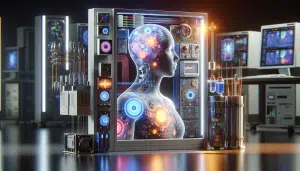Why Quantum Computing Could Change Everything for You
Ethan Harris October 31, 2025
Quantum computing is reshaping the landscape of technology, promising faster solutions for problems nobody thought solvable a decade ago. This article guides you through the essentials, real-world possibilities, privacy implications, and what researchers say about the future—and how it may directly shape the devices you rely on every day.
Quantum Computing Unveiled: The Science Behind the Hype
Quantum computing is a leap beyond classical computing. Unlike conventional bits, which are either 0 or 1, quantum computers use qubits that can be 0, 1, or both simultaneously. This core concept, called superposition, allows quantum computers to perform complex computations much faster than traditional machines. Entanglement, another quantum property, connects two qubits so that changing one changes the other instantly, no matter the distance. Scientists and engineers believe these principles could unlock possibilities not feasible with today’s computers, from breaking encryption to simulating molecules for drug discovery (Source: https://www.nature.com/articles/d41586-019-01317-8).
What sets quantum computing apart is its potential to process enormous datasets and solve intractable problems. Imagine optimizing a transportation network across a megacity or modeling climate change in a way that pinpoints solutions previously out of reach. These advances stem from quantum parallelism, letting these machines process many answers at once. For businesses, financial institutions, and the field of artificial intelligence, this means analyzing scenarios and predicting outcomes faster than ever before. This parallelism stands in stark contrast to the sequential nature of classical computation, which handles problems one step at a time.
The challenge? Building quantum computers robust and reliable enough for commercial use. Qubits are extremely fragile, easily disrupted by temperature, vibration, or electromagnetic noise—a phenomenon known as decoherence. Quantum hardware requires specialized environments, sometimes colder than deep space, to operate without error. Research labs worldwide are working on error correction and stabilization to bring scalable, accessible quantum technology closer to reality (Source: https://www.ibm.com/quantum/roadmap).
Real-World Applications: From Healthcare to Cybersecurity
Quantum computing’s practical applications are expanding. In healthcare, it could help model new pharmaceuticals or analyze genomic data at speeds impossible for classical computers. This may contribute to personalized medicine, targeting treatments to genetic markers or simulating complex protein folding, aiding disease research (Source: https://www.nih.gov/news-events/nih-research-matters/quantum-computing-health-research).
Cybersecurity is in the spotlight too. Quantum computers can, in theory, break widely used encryption methods by rapidly factoring large numbers—something classical computers struggle with. While this risk is driving the search for quantum-safe encryption, the same technology could create unbreakable codes using quantum key distribution. Organizations and governments are racing to future-proof digital infrastructure against these changes, triggering increased investment in post-quantum cryptography research.
Other fields stand to benefit as well. Logistics companies can optimize delivery routes for efficiency, potentially saving fuel and time on a massive scale. Banks use quantum algorithms for faster, more accurate risk assessments or fraud detection. Even weather prediction and climate modeling could transform, helping society plan better for extreme events or long-term changes. These real-world uses highlight why so many are watching quantum developments with interest and anticipation.
Inside the Quantum Race: Who’s Leading Innovation?
The global race to develop practical quantum computers features both public and private sector leaders. Companies like IBM, Google, and Microsoft are investing billions, while countries such as China, the United States, and Germany sponsor major research initiatives. Each player uses a unique technological approach, from superconducting qubits to trapped ions and photonic systems. These different architectures reflect the search for a balance between stability, scalability, and error resistance (Source: https://www.quantum.gov/).
Government agencies recognize quantum computing as a strategic asset. National programs are forming partnerships between universities, laboratories, and tech giants to advance research and workforce development. Education is a strong focus—building a new generation of quantum engineers and theorists who understand this multidisciplinary science. Collaborative projects across borders aim to accelerate breakthroughs while navigating the sensitive issue of technological competition.
Despite fierce competition, the quantum community remains relatively open, publishing research and sharing experimental methods to move discovery forward. Conferences, open-access journals, and shared quantum development kits empower scientists everywhere to contribute. The push for standardization ensures that as quantum hardware matures, it integrates smoothly into existing tech ecosystems, benefiting industries and society as a whole. This cooperative approach signals higher chances for worldwide advancement—and for new breakthroughs to rapidly reach end users.
Privacy and Security in a Quantum World
Quantum computing ushers in both opportunities and risks for privacy and security. While quantum algorithms might one day break current encryption schemes, ongoing research into quantum-resistant cryptography is already underway. Organizations are urged to inventory data that needs long-term confidentiality and begin implementing new security techniques, sometimes called “crypto-agility,” so systems can adapt as technology evolves (Source: https://www.nist.gov/programs-projects/post-quantum-cryptography).
What does privacy look like in a quantum future? It’s a moving target. Sensitive communications—from financial records to healthcare files—must be protected against quantum code-breaking. Some experts are exploring quantum key distribution, a way to set encryption keys using quantum physics itself. Any attempt to intercept such messages changes the quantum state, alerting parties to an eavesdropper. This forms the basis of quantum-secure communication networks under early development in several countries.
Consumers and businesses alike should stay informed. Experts recommend following updates from international standards bodies and tech consortia working on post-quantum security. As the timeline for practical quantum computers remains uncertain, preparing digital systems now provides a safety margin. Attention to privacy and adaptability in cryptographic methods is essential for anyone relying on digital infrastructure—from banks and hospitals to everyday cloud service providers.
Quantum Computing and Artificial Intelligence: A Dynamic Duo
Artificial intelligence and quantum computing could become highly complementary technologies. Quantum computers excel at searching large datasets and solving optimization problems, both critical for training and enhancing AI algorithms. Machine learning models—already revolutionizing everything from language processing to scientific discovery—could reach new levels with quantum acceleration. Researchers imagine advanced pattern recognition or simulations requiring less energy and far less time than with classical computers alone (Source: https://ai.googleblog.com/2019/10/quantum-supremacy-using-random-circuit.html).
One notable area is the quantum neural network, a quantum variant of today’s deep learning models. These networks, still in experimental stages, could analyze multidimensional data—such as images or genome sequences—more efficiently. AI’s demand for computational resources aligns with quantum computing’s ability to parallelize searches and model highly complex scenarios. This synergy may pave the way for breakthroughs in fields like climate science, materials engineering, and personalized healthcare diagnostics.
However, the capabilities of quantum-enhanced AI remain mostly theoretical for now. Building scalable quantum computers capable of supporting these powerful algorithms is ongoing work. Progress is steady, though. Each hardware advance brings closer the prospect of hybrid quantum-classical systems, integrating the best of both worlds. Companies and research labs continue to publish demonstrations of quantum machine learning, suggesting these developments will soon move from experiment to practical application.
Preparing for a Quantum Future: What Industry and Individuals Should Know
Companies are already planning for the quantum era. Many financial, healthcare, and national security organizations assess their “quantum readiness,” identifying where this technology could bring benefit or risk. Training programs, industry consortia, and cross-sector alliances promote knowledge sharing and clarify expectations about timelines and implementation. For citizens, awareness of quantum developments means understanding how technology could shape daily life, from online privacy to accessible medicine (Source: https://csrc.nist.gov/publications/detail/sp/800-203/final).
There’s also a growing conversation about ethics in quantum computing. As with any powerful innovation, its use should focus on societal benefit, transparency, and responsible development. Industry standards and government regulations will shape how quantum gains are introduced and managed. By including diverse voices from various disciplines and sectors, society can ensure that this revolutionary science serves the broader good.
Staying curious is key. Technology moves quickly, and quantum computing is no different. Individuals, businesses, and policymakers who keep learning, adapt, and invest in quantum literacy position themselves for opportunity. Whether following news from the world’s top quantum labs or exploring the first real-world quantum applications, everyone has a role to play in preparing for a future shaped by this breakthrough technology.
References
1. Gibney, E. (2019). The quantum gold rush. Nature. Retrieved from https://www.nature.com/articles/d41586-019-01317-8
2. IBM. (n.d.). The Quantum Decade: Roadmap for quantum computing. Retrieved from https://www.ibm.com/quantum/roadmap
3. National Institutes of Health. (2021). Quantum computing for health research. Retrieved from https://www.nih.gov/news-events/nih-research-matters/quantum-computing-health-research
4. Quantum.gov. (n.d.). National Quantum Initiative. Retrieved from https://www.quantum.gov/
5. National Institute of Standards and Technology. (n.d.). Post-Quantum Cryptography. Retrieved from https://www.nist.gov/programs-projects/post-quantum-cryptography
6. Google AI Blog. (2019). Quantum supremacy using a programmable superconducting processor. Retrieved from https://ai.googleblog.com/2019/10/quantum-supremacy-using-random-circuit.html







